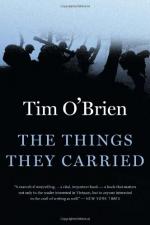|
|
The Things They Carried Author/Context
Though The Things They Carried is mainly fiction, Tim O'Brien did fight in Vietnam, and he has been telling "true war stories" since he returned from the war. His stories come from his own experiences, and his desire to blur the lines between reality and fiction, between created character and living person. He believes that stories are born from real events, and therefore are forever linked to them. He, like the narrator in Carried, grew up in a small town in Minnesota, in a town much like Norman Bowker's hometown: people were patriotic and hardworking, but not very thoughtful. O'Brien began writing at a young age, and soon after became interested in politics; both pursuits were supported by his family. O'Brien admired John F. Kennedy, and, like the Tim O'Brien of Carried, disliked the political ignorance of his hometown. He also admired his father, who read obsessively and had a great respect for knowledge. However, his father was an alcoholic, which strained their relationship at times, and made Tim insecure and lonely.
O'Brien escaped to college, where he learned to love literature and, for the first time, tried seriously to be a writer. He also began to protest the Vietnam War: he believed strongly that it was wrong, and wanted desperately to stop it. Two weeks after he graduated, he received his draft notice. That summer, he says, made him a real writer: the conflicting emotions and ideas in his head forced their way onto the page. Though he is sure that, looking back, he would find the prose terrible, he knows that the war had a central role in his development as a writer. Like Tim in Carried, he went to the war because he was ashamed not to, and he regrets it to this day. He refuses to accept any justification of his actions: he was young, yes, but he should have known better. He received honors in the war, but he refuses to talk about them or label himself "courageous." Not only were his deeds unremarkable, he says, but they were not done before he decided he was unlikely to get hurt doing them. He promised himself that after he returned home he would write books about why the war was morally wrong. He still thinks of the war as what made him a writer: it was his first and most important subject. O'Brien, quoted by Barth Healy, has said of his writings on the war,
"It was like trying to pin the tail on the Asian donkey, but there was no tail and no donkey. In a year I only saw the living enemy once. All I saw were flashes from the foliage and the results, the bodies. In books or films it is desirable to have a climactic battle scene, but the world does not operate in those gross dramatic terms. In Vietnam there was a general aimlessness, not just in the physical sense, but beyond that in the moral and ethical sense."O'Brien has been a consistently successful author. He is also a determined and obsessive one: he has said that his dedication to perfection has taken a toll on his personal life, and that because of his writing habits, he can only write one book every four or five years. His commitment is evident in the critical reception of his body of work: his 1979 memoir, If I Die in a Combat Zone, won great acclaim, as did another novel about the Vietnam War, Going After Cacciato, which won the National Book Award in 1979. However, he has also written well-respected books that have little to do with Vietnam: In the Lake of the Woods received the James Fenimore Cooper Prize, and Tomcat in Love was a bestseller. These books focus on more universal themes: humor, deception, control over one's own destiny. Indeed, even the "Vietnam books" are only partly about that specific time and place. They are also about war in general, and brotherhood, and courage, imagination, and shame. Robert Harris wrote:
"By moving beyond the horror of the fighting to examine with sensitivity and insight the nature of courage and fear, by questioning the role that imagination plays in helping to form our memories and our own versions of truth, he places 'The Things They Carried' high up on the list of best fiction about any war."Bibliography
Harris, Robert R. "Too Embarrassed Not to Kill." New York Times Book Review. March 11, 1990, pg. 8.
Healy, Barth. "Flashes from the Foliage." New York Times Book Review. March 11, 1990, pg. 8.
Herzog, Tobey. Tim O'Brien. New York: Twayne Publishers, 1997.
O'Brien, Tim. The Things They Carried. Boston: Houghton Mifflin, 1990.




